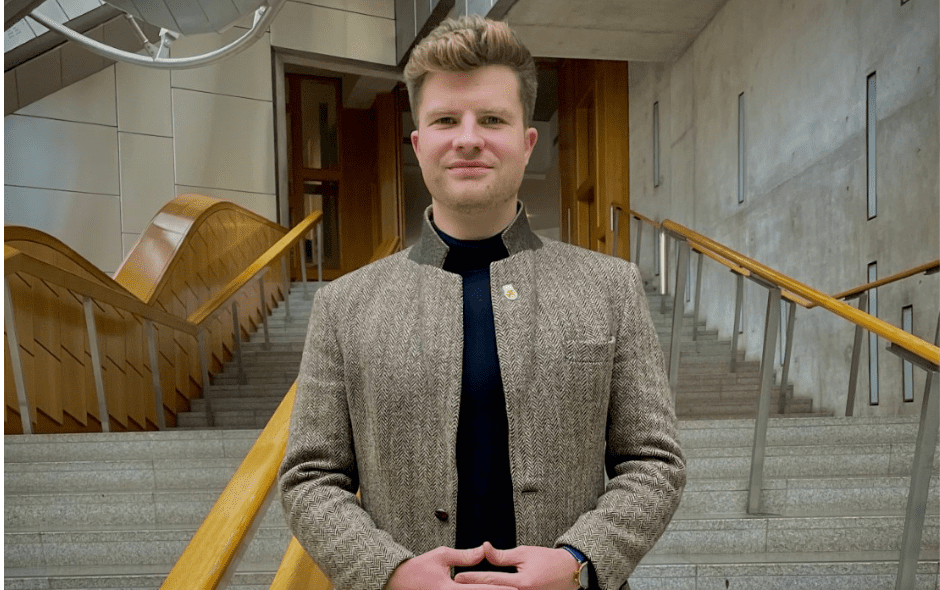We continue to help you get to know our trustees. Today, Michael Sturrock explains what particularly interests him about Epilepsy Scotland and what he hopes to bring to the organisation.
Why did you join Epilepsy Scotland as a trustee?
I have had epilepsy for nearly a decade now and have benefited a great deal from the work of Epilepsy Scotland, the NHS, and other organisations, both directly and indirectly.
From a personal perspective, I felt I have not done enough to help other young people who have epilepsy like myself. Seeing Epilepsy Scotland’s work and hearing about the campaign agenda really motivated me to reach out and ask if I could be of any use.
As someone relatively young with epilepsy too—and with no disrespect at all to my board colleagues—I thought I could lend a different perspective.
What particularly interests you about Epilepsy Scotland?
While, of course, epilepsy affects great numbers of people the world over, I love the sense of community I have observed in Epilepsy Scotland.
I thought it was really touching to see so many people come together in support and friendship at the opening of the Wellbeing Garden. Also, I know those who attend get-togethers across the country prize this group connection, too.
I think this in itself is as valuable as the practical services themselves and is something that sets Epilepsy Scotland apart.
Also, the issues atop the agenda of the three-year plan are fascinating. How people with epilepsy—and of other neurodiverse dispositions—are treated within the justice system needs to be looked at closely so that it is as accessible and fair to someone with epilepsy as anyone else. I am fascinated to see how this work progresses.
What is your background in terms of skills and experience?
I’m not sure if epilepsy is a skill, but it is certainly an experience!
We can never have too many perspectives on how epilepsy affects people. I think my primary use will be to feed in my experience as a ‘normal’ person with epilepsy navigating their daily lives.
Aside from that, my day-to-day work is focussed around politics, policy, and campaigning. We need to do more to educate the population as a whole on epilepsy and its related issues, but we also need to change the minds of those who make the decisions.
I have seen the amazing policy team at work and hope I can be an extra pair of hands doing this work if ever they need it!
I have also been involved in the data and tech sphere. As we all know, technology will play a greater role in monitoring, treating, and just making life easier for those with epilepsy. I hope I can bring a little insight on that front, too.
What are the main responsibilities of being a trustee?
Above all, we are there to look out for the best interests of the beneficiaries of Epilepsy Scotland and its services, the charity itself, and its staff.
We do this through advising on charity policies, services, and activities to ensure they play a part in the charity’s governing document. We also help to manage budgets and resources.
What is the trustees’ role in relation to the Chief Executive?
Listening and being a sounding board is a key way we help the CEO. As we all know, the leadership of Lesslie Young and the brilliant staff is second to none.
Nonetheless, trustees can offer a second pair of eyes and advice on issues that come up to ensure the organisation is on the right path.
We can also bring in our own personal and professional experience to help work through any arising issues or general strategy.
What are the advantages of having a trustee board made up of people from all sorts of backgrounds with different skills and experience?
Epilepsy affects people in all situations. Getting as many perspectives on the issues will be valuable so we can anticipate and help those in as wide-ranging circumstances as possible and be as inclusive as we can.
From a professional perspective, sometimes, when people with particular skills are used to a way of working, we can miss helpful or alternative paths to success.
So, having a broad range of professional skills will help us think of a range of ways to tackle the issues facing Epilepsy Scotland.
Plus, diversity makes for more fun and interesting conversations!
What do you hope to bring to Epilepsy Scotland?
Ultimately, I hope I can help everyone at Epilepsy Scotland keep doing what they are doing!
I know there is a really bright future and exciting agenda for the next three years and I really look forward to lending a hand in any way I can.




